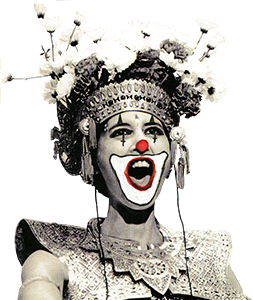‘The world is not to blame, so why blame the world’
Here’s Jan Lauwers’ explanation of the concepts and process that Needcompany used in creating the play that we saw at deSingel in August:

THE BLIND POET is the latest play by Jan Lauwers, in close cooperation with the composer Maarten Seghers, which will premiere at the Kunstenfestivaldesarts in the spring 2015. Jan Lauwers starts out from the performers’ family trees and is writing a new story based on their various nationalities, cultures and languages. He goes back a thousand years to ponder the notion of identity in today’s multicultural Europe. Lauwers quotes the work of Abu al ‘ala al Ma’arri, a blind Arab poet who spanned the 10th and 11th centuries, and Wallada bint al Mustakfi, an Andalusian poet from the 11th century. Their work describes a time in which women held positions of power and atheism was commonplace, when Paris was just a small provincial town and Charlemagne was a famous illiterate. History is written by the victors. By men. How much has the history we know actually been determined by lies, chance encounters and events along the way? About strong women who throw stones and end up at the stake. About a crusader in armour that’s too small.
When the mind is uncertain,
It is overwhelmed by the world,
A weak man kissed by a whore.
When the mind has become self-assured,
Then the world is a respectable lady,
Who rejects her lovers’ caresses.
Abu al ‘ala al Ma’arri (c. 950)
“The poem above is written by the blind Syrian poet Abu al ‘ala al Ma’arri. The idea of ‘The Blind Poet’ arose when I was visiting the great mosque in Cordoba. In the middle of this unique building with its three hundred columns, the Catholic church knocked down a number of columns and stuck in a cathedral. This cathedral looks small and pretty ridiculous in the middle of the sophisticated ‘Moorish’ architecture. I stood there looking in astonishment at all this historical bungling.
Cordoba was the capital of that world. Between 300,000 and 1 million people lived there. Women held positions of power and translated Plato, and atheism was common. It had several libraries and more than 600,000 books and much more besides. By comparison, the largest city in the Christian world was Paris, with about 30,000 inhabitants. The largest Christian library had 60,000 books and Charlemagne was illiterate.
What does this actually mean? Why does history always lie and deceive us? History is written by the victors. By men. By the few who tell the masses what to do.
In 11th-century Cordoba women were men’s equals. Islamic women at least. The Christian women found them too bold, too dangerous.
This Cordoba story is only one of the many examples of how history comes back to us. ‘The Blind Poet’ journeys through history via the family tree of all Needcompany’s members. In this way we found that everyone had a link or similarity to everyone else. One of my forefathers was an armourer at the time of Godfrey of Bouillon and went on a crusade with him. They travelled through Germany, where Grace Ellen Barkey’s ancestor received them as a mayor.
With God I aim for honour and glory, and proudly go my own way
To my lover I offer my cheeks, and my lips I give to whoever wants them.
Wallada bint al Mustakfi (Cordoba, 1000 AD)
How much has the history we know actually been determined by lies, chance encounters and events along the way?
About strong women who throw stones and end up at the stake.
About a crusader in armour that’s too small. ”
-Jan Lauwers